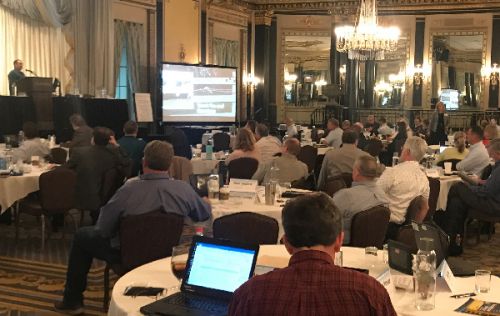National Response Team/Regional Response Teams Co-Chairs Meeting
MAY 20, 2019 — Each year the leadership from the U.S. national and regional oil and hazardous substance preparedness and response interagency partners gather to share information and plan future work.
The 2019 National Response Team-Regional Response Team Co-Chairs meeting (“NRT-RRT Co-Chairs”) was held in Chicago on May 1-2. NOAA represents the Department of Commerce within the nation’s oil and hazardous substance system, with our National Response Team representation provided by the Emergency Response Division Chief, and field Scientific Support Coordinators providing the Department’s Regional Response Team representatives.
NOAA’s contributions to this year’s NRT-RRT Co-Chairs meeting included a briefing on the recent completion of the work on the Arctic State of the Science for Dispersants and Dispersed Oil initiative coordinated by the joint NOAA-UNH Coastal Response Research Center. This presentation was part of an overall session on the topic of dispersants designed to brief attendees on publications, foster discussion, obtain perspectives on how new publicly available information will influence planning, decision-making, research and development, and communication. The NOAA presentation was provided along with the National Academies of Science, Engineering, and Medicine’s report on the pre-publication version of The Use of Chemical Dispersants in Marine Oil Spill Response.
Given the venue located on the Great Lakes, the NRT welcomed the Director of NOAA’s Great Lakes Environmental Research Laboratory who presented on freshwater science and the Lab’s role as well as an overview of NOAA capabilities and roles on the Lakes as part of an overall Great Lakes and Inland Waterways session. OR&R presented on the Environmental Sensitivity Index updates underway to the Straits of Mackinac and the St. Clair Lake/River.
OR&R also presented on recent research and development initiatives with a focus on remote sensing, various methods for reviewing spill response technologies, and recent complex case studies.
For more information contact Scott.Lundgren@noaa.gov.
 An official website of the United States government.
An official website of the United States government.

